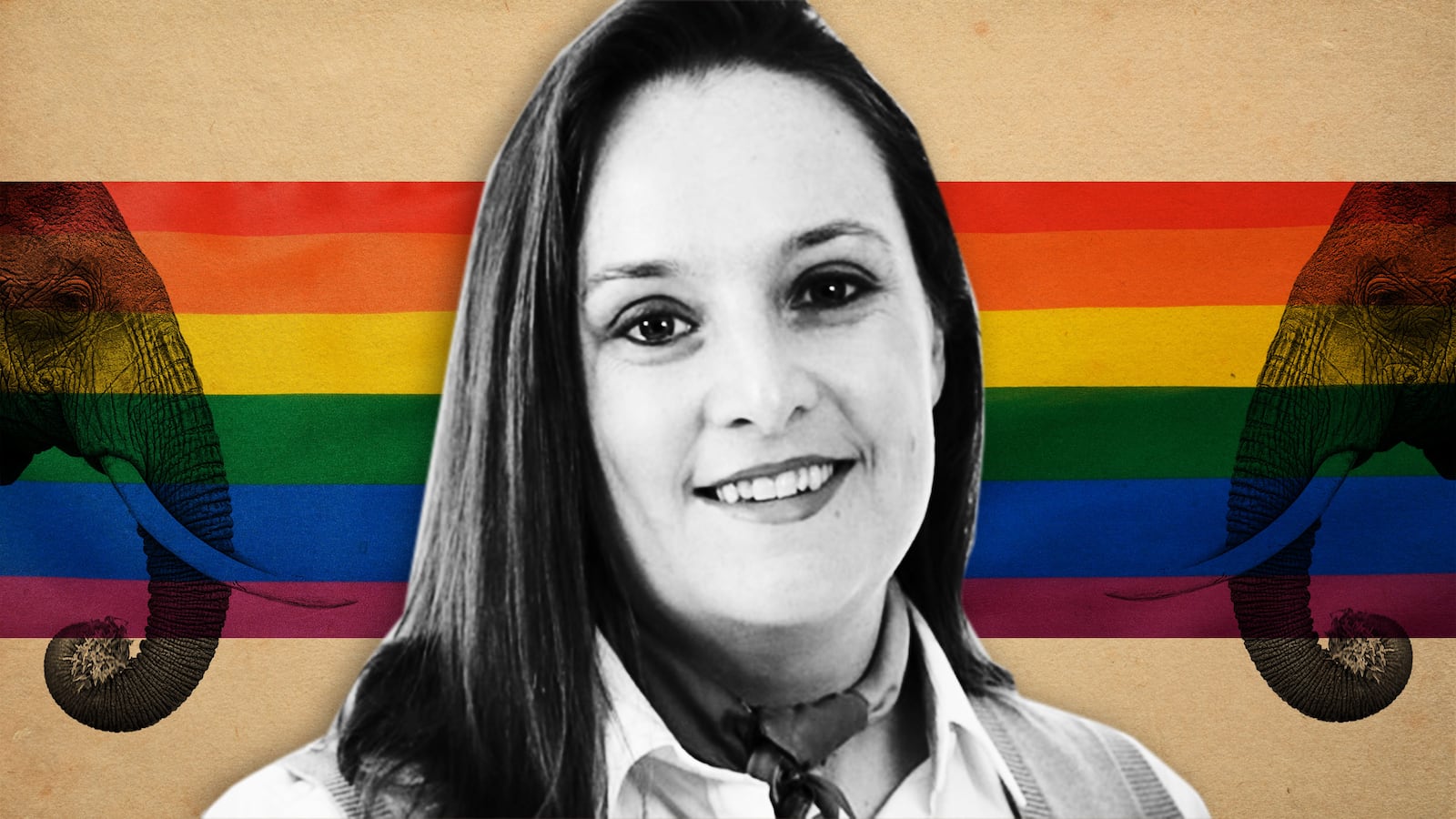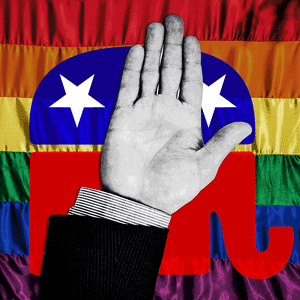Jerri Ann Henry wants LGBT-friendly Republicans to be louder.
Henry, the new executive director of the Log Cabin Republicans and former manager of Young Conservatives for the Freedom to Marry, told The Daily Beast that LGBT people and allies on the right side of the aisle routinely approach her after public appearances.
“Every time I’ve spoken to people, I’ve probably had three or four people come up after the speech, grab me, and say something along the lines of, ‘I’m a Republican like you, but shhh! We’re the only ones,’” Henry, now one month into her role at the head of the LGBT conservative organization, told The Daily Beast.
Hearing that so often can be frustrating: “Sometimes I want to shake them, because I’m like, ‘Look, there are four people who just came up to me and said that.’”
It’s true that a considerable number of Republicans are now in favor of LGBT rights. Forty percent, according to Pew Research Center data, now support same-sex marriage.
Far fewer—about 19 percent, per Pew—believe that a person’s gender can be different from their birth-assigned sex, although even that figure may be surprising, given how vigorously some in the party have pushed anti-transgender policy.
And, of course, some LGBT people are Republicans themselves: 2016 Pew data indicates that 18 percent of lesbian, gay, and bisexual voters lean to the right.
But growing support from within has yet to cause major change at the top. The 2016 Republican platform was dubbed the “most anti-LGBT” in the party’s history by none other than Henry’s predecessor, Gregory T. Angelo. The Trump administration has pursued several anti-LGBT initiatives, most notably a transgender troop ban. And in the 2018 midterms, zero out LGBT Republican candidates won congressional primaries.
On that last point, Henry points to the fact that straight Republican women have been struggling to secure nominations for congressional seats as well, so one can imagine how tough the terrain might be for LGBT candidates on the right.
“Take that and multiply it by 1000 and that’s the process for any gay or trans Republican to even make it through a primary and be able to run,” Henry told The Daily Beast. “But there are some out there, and we’re working on it.”
Henry, a political strategist who campaigned for marriage equality before the 2015 Obergefell Supreme Court decision, is the first woman to head the Log Cabin Republicans. She is an out, married lesbian who, of her own admission, has “been pretty critical of Trump in the past.” That said, she would accept an invitation from the president to discuss LGBT issues.
“I would [take a meeting],” she told The Daily Beast. “I can’t let my frustrations with him force me to walk away from a solution… I’m not interested in a meeting just for the sake of a meeting but I would take a meeting to work on policy—and there’s a lot of that work that can be done.”
Henry is well aware that LGBT people on the left—and that’s most of them—might think it a fool’s errand to advocate for the community from within the GOP. Log Cabin has long been criticized along those lines. Henry says that she is pained by some of the rhetoric against the very idea that an LGBT person like her could be a Republican.
“It’s all punchy and calling each other out and everyone acting as warriors against each other who can find no compromise,” she said. “That needs to stop.”
But on a more practical level, Henry would remind Log Cabin’s critics that it could be all but impossible to secure LGBT equality without getting more Republicans on board.
“Even with the [Democratic] majority that was just won in the House, none of the changes that we want to see will happen without some support on both sides,” she said. “That’s kind of a universal truth for as long as the United States has been around.”
Indeed, several LGBT milestones remain out of reach without Republican support. Most notably, there is no federal law directly prohibiting discrimination based on sexual orientation or gender identity—although several courts have interpreted existing civil rights legislation to that effect.
House Democrats recently pledged to pass the Equality Act in the coming session to address this issue, but if they succeed the bill would head to a Senate that remains under Republican control. And although the balance of power in Congress might shift in the future, Henry maintains that the GOP isn’t going anywhere.
“The Republican Party is going to be around for a while, long past this administration, so we need to make sure it’s capable of handling future challenges and growing,” she said. “I would say that reflects not just LGBTQ Americans but minorities, different religious groups, and women.”
But Henry’s long-term vision for a more inclusive Republican Party will require getting through at least two more years of the Trump administration first.
Log Cabin’s approach to Trump has been the subject of intense scrutiny.
In 2016, the group declined to endorse Trump, saying that even though he “spoke positively about the LGBT community in the United States” he has also “surrounded himself with senior advisers” who have anti-LGBT records.
Henry’s predecessor, Gregory T. Angelo, drew some criticism when he said last year that Trump was “the most pro-LGBT Republican president in history.”
Recently, Henry told The Hill that Trump “has been more vocally supportive” than other Republican presidents, but that “there have been a few things that I haven’t loved that the administration has done.”
Henry believes that many of the anti-LGBT moves from the White House originate not with Trump himself but with advisers who have his ear.
“The answer to that is we have to make sure that we’re in his ear, too,” said Henry.
The Daily Beast and other outlets have borne out some of Henry’s thoughts on Trump. The transgender troop ban, for example, was allegedly a pet project of Vice President Mike Pence before Trump hastily tweeted it out. Last year, citing insider sources, the Washington Post described Trump’s LGBT positions as largely “transactional.”
If Trump were categorically anti-LGBT, some on the right say, then he wouldn’t have nominated a lesbian federal judge this August or appointed Richard Grenell, a gay Republican, as the ambassador to Germany.
In those appointments, Henry sees a glimmer of hope where others might see a lost cause. And if the Log Cabin Republicans don’t try to push Trump in a more pro-LGBT direction from within the party, she asks, then who will?
“If nobody is pushing the administration on how they can achieve [LGBT reform] with conservative thinking, then there’s no way our policy initiatives will happen,” she said. “We have to be there. We have to get louder on that.”







